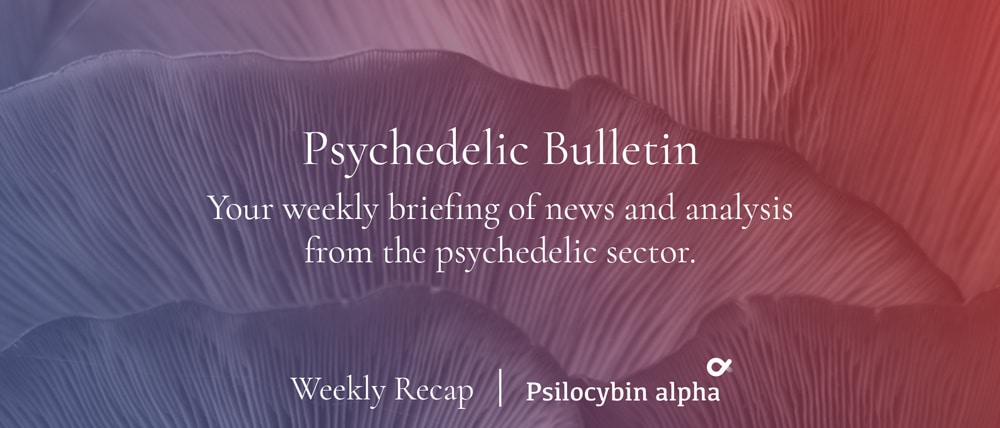In what seems like a natural move, the University of California, San Francisco, announced this week the launch of a psychedelics research division, propelled by $6.4m in private funding. This funding came from a number of donors, including COMPASS Pathways founders George Goldsmith and Ekaterina Malievskaia, and popular author and podcaster Tim Ferriss.
Besides this announcement, it’s been a relatively quiet week.
Psychedelic Sector News
Horizons’ Psychedelic ETF Rebalanced for the First Time
The world’s first psychedelics ETF has undergone its first rebalancing, with four companies added and one removed.
Added:
- Algernon Pharmaceuticals
- BetterLife Pharma
- Core One Labs
- Lobe Sciences
Removed:
- Nova Mentis
You can learn more about the ETF, including its constituents and mechanisms, here.
MindMed’s 18-MC Patent Application Published
This week, a new MindMed patent application published, on compositions of 18-methoxycoronaridine (18-MC) and their use to treat substance use disorders, prevent addictive behavior, and prevent craving, for substances such as cocaine, nicotine, opiates, alcohol, morphine, and methamphetamine.
18-MC is a non-hallucinogenic synthetic analog of ibogaine that MindMed has called “the antibiotic of addiction.” It was first synthesized in 1996 by researchers at Albany Medical College and the University of Vermont, who were looking to make safer versions of ibogaine that would share its efficacy at treating addiction and withdrawal symptoms, but without its undesirable side effects.
Early studies in rats demonstrated that it could potentially serve as a safe and effective treatment for drug abuse. MindMed’s 18-MC program, named “Project Layla,” is currently in Phase 1, with preliminary data showing safety and tolerability at the doses tested. MindMed has announced a confirmed meeting with the FDA to continue discussing clinical development, with plans to initiate a Phase 2a proof of concept study soon, in hopes of filing an NDA by Q4 2025.
This is MindMed’s first published patent application, outside of a family of applications on 3-methylmethcathinone (3-MMC) assisted psychotherapy, which were initially filed by Therapeutic Adjuncts Inc. and Recraceutical Corp. BV, to inventors Mark Haden (of MAPS Canada), Ezekiel Golan, and René van Wettum.
Our editor-at-large Graham Pechenik provided additional analysis on Twitter.
Other News:
- AIkido Pharma sponsors PTSD research at Mount Sinai;
- Changes at the top for Cybin;
- MindMed adds Stanford neuroscientist as Chair of Scientific Advisory Board;
- Noetic launched a venture studio to build psychedelic biotechs;
- COMPASS appoints Wayne J Riley MD to Board.
Financials, Financings and IPOs
This week, MindMed shared their year-end financials, Wesana Health closed a $16.1m round, and Champignon inched closer to a re-listing in Canada.
MindMed Shares 2020 Year-End Financials
MindMed announced its 2020 year-end financial results this week, showing a cash balance of $161m (USD).
Wesana Closes $16.1m Placement
Wesana Health, which is seeking to apply psychedelic medicine to the treatment of traumatic brain injury (TBI) announced the closing of a $16.1m (CAD) round this week.
Champignon Applies for Revocation of Cease Trade Order
There may be light at the end of the tunnel for Champignon Brands, which has been subject to a cease trade order for the better part of a year. The Toronto-based company announced late last Friday that it has now filed a listing statement with the CSE, and an application to the BC and Ontario Securities Commissions requesting the revocation of the Cease Trade Order.
Weekend Reading
Massachusetts City Council Votes to Decriminalize Psychedelics
Yesterday night the City Council of Northampton, MA voted to decriminalize entheogenic plants. This move comes just weeks after Harvard-affiliated Mass General Hospital announced its dedicated psychedelics research center.
As with similar measures in other US cities, the vote does not change the law – this power resides at the state level. Rather, this resolution stipulates that no public employees of the city (including police) should prioritize the enforcement of criminal charges pertaining to the possession of natural psychedelics.
The measure was nearly unanimous, with just one councilor abstaining. Read more at Mass Live.
UCSF Launches $6.4m Psychedelics Research Division
University of California, San Francisco (UCSF) is putting $6.4m of private funding to work via the founding of a new psychedelics research division, which will form part of its Neuroscape program.
Robert Carhart-Harris will head-up the division, which will “take a unique translational research approach to integrate cutting-edge neuroscience technology with psychedelics treatment.”
Stay Informed in 2021
We can only expect the rate of change and development in the psychedelic space to continue accelerating in 2021. Stay informed via our various platforms and channels…
Weekly Bulletins
Join our newsletter to have our Weekly Bulletin delivered to your inbox every Friday evening. We summarise the week’s most important developments and share our Weekend Reading suggestions.
Live Updates
Join us on Twitter for the latest news and analysis.
Other Channels
You can also find us on LinkedIn, Instragram, and Facebook.


